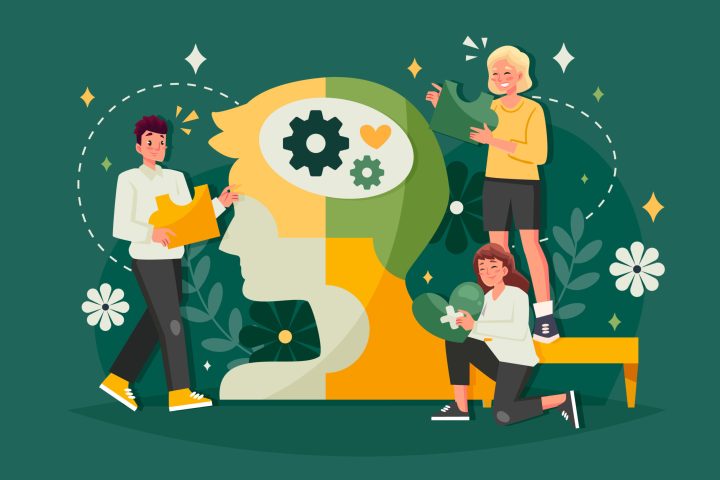Treating ADHD without medication is possible. This method involves lifestyle changes and behavioral strategies.
ADHD, or Attention-Deficit/Hyperactivity Disorder, affects many children and adults. Symptoms often include trouble focusing, hyperactivity, and impulsiveness. While medication is a common treatment, some seek alternatives. Non-medical approaches can be effective. These methods include diet changes, exercise, and therapy. They help manage symptoms naturally.
Understanding these options can empower those with ADHD. They offer control and hope. In this blog, we will explore various non-medical strategies. These methods can improve daily life. They can enhance focus and reduce hyperactivity. Read on to learn how to help ADHD without medication. Discover practical tips and solutions. Let’s dive in and find the best approach for you or your loved ones.
Topic of Contents
ToggleIntroduction To Adhd
Attention Deficit Hyperactivity Disorder (ADHD) is a common condition. It affects both children and adults. Understanding ADHD is the first step to managing it effectively. Many people live with ADHD without even knowing it. Learning about its symptoms can help in seeking the right support.
What Is Adhd?
ADHD stands for Attention Deficit Hyperactivity Disorder. It is a neurological condition. It affects a person’s ability to focus and control impulses. ADHD can make daily tasks challenging. It is not just a childhood disorder. Adults can have ADHD too. The exact cause of ADHD is not known. Genetics, brain structure, and environmental factors play a role. ADHD affects each person differently. No two cases are the same.
Common Symptoms
ADHD has several symptoms. These can vary from person to person. Some common symptoms include:
- Trouble paying attention
- Being easily distracted
- Difficulty following instructions
- Forgetfulness
- Impulsiveness
- Restlessness
- Frequent daydreaming
- Difficulty staying organized
These symptoms can affect school, work, and relationships. They can make daily tasks harder. Recognizing these symptoms is important. It helps in getting the right help and support. Early intervention can make a big difference.

Diet And Nutrition
Managing ADHD without medication can be challenging. Diet and nutrition play a crucial role in helping manage ADHD symptoms. A well-balanced diet can improve focus and reduce hyperactivity. What we eat impacts our brain function and behavior. Understanding the right foods to include and avoid can make a significant difference.
Balanced Diet
A balanced diet provides essential nutrients for brain health. Include whole grains, lean proteins, and plenty of fruits and vegetables. These foods supply the body with vitamins and minerals. Omega-3 fatty acids are important for brain function. Find them in fish, nuts, and seeds. Protein is vital for producing brain chemicals. Choose lean meats, beans, and dairy products. Keep blood sugar levels stable with complex carbohydrates. Oats, brown rice, and whole wheat bread are good choices. Hydration is key. Encourage drinking plenty of water throughout the day.
Foods To Avoid
Some foods can worsen ADHD symptoms. Sugar and artificial additives should be limited. These can cause spikes and crashes in energy levels. Avoid processed and junk foods. They lack essential nutrients and can affect mood and behavior. Caffeine can increase hyperactivity and anxiety. Reduce intake of soda, coffee, and energy drinks. Certain food dyes and preservatives may trigger symptoms. Read labels carefully and choose natural options. High-fat and fried foods can slow brain function. Opt for healthier cooking methods like baking or grilling.
Physical Activity
Physical activity plays a crucial role in managing ADHD symptoms. Engaging in regular exercise can boost focus, reduce hyperactivity, and improve overall well-being. This section explores the benefits of exercise and suggests some effective activities for those with ADHD.
Exercise Benefits
Regular physical activity offers numerous benefits for individuals with ADHD, including:
- Improved focus and concentration: Exercise increases dopamine levels, helping with attention.
- Reduced hyperactivity: Physical activity helps release excess energy.
- Better mood regulation: Endorphins released during exercise can enhance mood.
- Enhanced sleep quality: Exercise promotes better sleep patterns.
- Increased self-esteem: Achieving fitness goals boosts confidence.
Recommended Activities
Here are some effective physical activities that can help manage ADHD symptoms:
- Aerobic exercises: Running, cycling, or swimming are great choices.
- Team sports: Soccer, basketball, or baseball encourage social interaction.
- Martial arts: Karate, judo, or taekwondo teach discipline and focus.
- Yoga: Yoga promotes relaxation and mindfulness.
- Dance: Dancing is fun and helps with coordination.
Incorporating these activities into daily routines can make a significant difference. Consistency is key. Aim for at least 30 minutes of physical activity each day.
Mindfulness And Meditation
Mindfulness and meditation offer effective ways to manage ADHD symptoms. These techniques help individuals focus, reduce stress, and improve overall well-being. By practicing mindfulness and meditation, one can cultivate a greater sense of awareness and control over their thoughts and actions.
Mindfulness Techniques
Mindfulness involves paying attention to the present moment without judgment. One simple technique is deep breathing. Focus on your breath as it moves in and out. Notice the rise and fall of your chest.
Body scan exercises are also beneficial. Lie down comfortably. Slowly shift your attention through different parts of your body. Start from your toes and move up to your head.
Another technique is mindful walking. Walk slowly and notice each step. Feel your feet touch the ground. Observe your surroundings with all your senses.
Meditation Practices
Meditation can be a powerful tool for managing ADHD. Start with guided meditation. Use apps or online resources to guide you through sessions. These can help you stay focused.
Practice sitting meditation for a few minutes each day. Find a quiet space. Sit comfortably and close your eyes. Focus on your breath or a mantra. If your mind wanders, gently bring it back.
Try loving-kindness meditation. Sit quietly and focus on feelings of love and kindness. Direct these feelings towards yourself and others. This can improve emotional regulation and reduce negative thoughts.
Behavioral Therapy
Behavioral therapy is a powerful tool for managing ADHD without medication. It focuses on changing specific behaviors and understanding the thoughts behind them. This approach helps individuals develop better coping strategies and improve their daily functioning. Let’s explore two effective methods within behavioral therapy.
Cognitive Behavioral Therapy
Cognitive Behavioral Therapy (CBT) is one method that can help people with ADHD. CBT focuses on identifying and changing negative thought patterns. It teaches individuals how their thoughts influence their behavior. By addressing these thoughts, people can learn to manage their symptoms better. Therapists use various techniques to help clients recognize and alter these patterns. This process can lead to more positive behaviors and improved self-control.
Parent Training
Parent training is another essential part of behavioral therapy for ADHD. It equips parents with the skills to support their children effectively. Parents learn techniques to manage their child’s behavior in a positive way. They also discover strategies to improve communication and set clear expectations. Consistent reinforcement and praise play a significant role in this training. Through parent training, families can create a supportive environment for children with ADHD. This approach fosters better relationships and helps children succeed.
Sleep Hygiene
Sleep hygiene is crucial for managing ADHD symptoms without medication. Good sleep can improve focus, mood, and overall well-being. Establishing a routine and maintaining a conducive sleep environment can make a significant difference.
Importance Of Sleep
Sleep plays a vital role in brain function. It helps with attention, learning, and memory. Lack of sleep can worsen ADHD symptoms. Children and adults with ADHD often struggle with sleep. They may find it hard to fall asleep or stay asleep. Quality sleep can reduce hyperactivity and improve concentration. Ensuring adequate sleep can lead to better days.
Creating A Sleep Routine
A consistent sleep routine can aid in better sleep. Go to bed and wake up at the same time every day. A routine helps regulate your body clock. Create a calming bedtime ritual. This can include reading a book or listening to soft music. Avoid screens before bedtime. The blue light from screens can interfere with sleep. Keep the bedroom cool, dark, and quiet. A comfortable sleep environment promotes better rest. Limit caffeine and sugar intake, especially in the evening. These can keep you awake and disrupt your sleep cycle.
Organizational Strategies
Living with ADHD can be challenging, especially without medication. But there are effective strategies to help manage symptoms. Organizational strategies play a crucial role in maintaining focus and productivity. Here, we discuss some practical tips.
Creating Structure
Creating a structured environment can significantly benefit those with ADHD. Begin by setting up a daily routine. Consistency helps in reducing anxiety and increasing predictability. Use visual aids like calendars and planners. This helps in keeping track of tasks and appointments.
Designate specific areas for different activities. Have a dedicated workspace for studying or working. This minimizes distractions and keeps you on task. Break larger tasks into smaller, manageable steps. This makes them less overwhelming and more achievable.
Time Management Tips
Time management can be a struggle for those with ADHD. Start by using timers or alarms. These can remind you to start or stop tasks. Prioritize tasks by importance. Focus on completing high-priority tasks first. Avoid multitasking, as it can lead to mistakes and frustration.
Set realistic deadlines. Allow yourself extra time to complete tasks. This reduces stress and increases the quality of work. Use tools like to-do lists. Mark off tasks as they are completed. This provides a sense of accomplishment and motivation to continue.
Support Systems
Support systems play a crucial role in helping individuals manage ADHD without medication. Establishing a network of support can make a significant difference in the daily lives of those with ADHD. In this section, we will explore the importance of family support and school accommodations in creating a nurturing environment for individuals with ADHD.
Family Support
It is the foundation of a strong support system for individuals with ADHD. Family members can provide encouragement, understanding, and patience. They can help establish routines that create a sense of stability and predictability.
Here are some ways families can support a loved one with ADHD:
- Establish a consistent daily routine.
- Break tasks into smaller, manageable steps.
- Provide positive reinforcement for completed tasks.
- Use visual aids to help with organization.
- Encourage open communication about challenges and successes.
Families can also seek support from ADHD support groups. These groups provide valuable insights and shared experiences that can help in managing ADHD symptoms.
School Accommodations
School accommodations are essential for students with ADHD. These accommodations ensure that students have the necessary support to succeed academically and socially.
| Accommodation | Description |
|---|---|
| Extended Time on Tests | Allows extra time to complete exams. |
| Preferential Seating | Seats the student in a distraction-free area. |
| Frequent Breaks | Provides short breaks during long tasks. |
| Assignment Modifications | Adjusts the length or format of assignments. |
Teachers and school staff can collaborate with parents to create an Individualized Education Plan (IEP). This plan outlines specific accommodations and strategies tailored to the student’s needs.
By implementing these support systems, individuals with ADHD can experience improved focus, reduced stress, and greater overall well-being.
Herbal Remedies And Supplements
Managing ADHD without medication is a growing interest for many individuals. The use of herbal remedies and supplements can be a natural and effective way to help manage symptoms. Below, we delve into popular herbal remedies and effective supplements that can aid in supporting ADHD management.
Popular Herbal Remedies
Many herbs have properties that may aid in reducing ADHD symptoms. Some of the popular herbal remedies include:
- Ginkgo Biloba: Enhances memory and cognitive function.
- Ginseng: Improves focus and reduces hyperactivity.
- Bacopa Monnieri: Known for its cognitive enhancement properties.
- Passionflower: Helps in reducing anxiety and restlessness.
- Valerian Root: Calms the mind and aids in better sleep.
Effective Supplements
In addition to herbal remedies, certain supplements can provide valuable support for ADHD management. These supplements often target nutritional deficiencies that may contribute to ADHD symptoms.
| Supplement | Benefits |
|---|---|
| Omega-3 Fatty Acids | Improves brain function and reduces inattention. |
| Magnesium | Calms the nervous system and supports focus. |
| Zinc | Supports neurotransmitter function and reduces hyperactivity. |
| Iron | Essential for brain health and cognitive function. |
| Vitamin B6 | Boosts brain development and reduces impulsivity. |
Combining herbal remedies and effective supplements can provide a holistic approach to managing ADHD. Always consult a healthcare professional before starting any new regimen.
Frequently Asked Questions
What Are Natural Ways To Help Adhd?
Natural ways to help ADHD include maintaining a healthy diet, regular exercise, mindfulness meditation, and behavioral therapy. These methods can improve focus and reduce symptoms.
Can Exercise Help With Adhd Symptoms?
Yes, exercise can help with ADHD symptoms. Physical activity increases dopamine and serotonin levels in the brain, which can improve focus and mood.
How Does Diet Affect Adhd?
Diet can significantly affect ADHD. Consuming whole foods, reducing sugar, and avoiding artificial additives can help manage symptoms. Omega-3 fatty acids are also beneficial.
Is Mindfulness Effective For Adhd?
Mindfulness can be effective for ADHD. It helps improve attention, reduce impulsivity, and manage stress. Regular practice is key for best results.
Conclusion
Helping ADHD without medication is possible with the right approach. Simple lifestyle changes can make a big difference. Healthy diet, regular exercise, and structured routines help manage symptoms. Practicing mindfulness and meditation can improve focus. Strong support systems, including family and teachers, are crucial.
Patience and consistency are key. Each child is unique, so tailor strategies to their needs. Remember, small steps lead to big improvements over time. Effective management of ADHD can enhance quality of life. Keep exploring and adapting methods that work best for your child.
Your efforts can create a positive impact.







